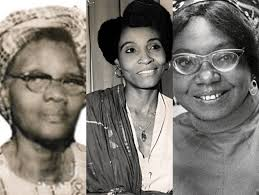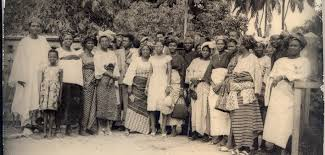Nigerian women played a pivotal role in the nation’s fight for independence, a chapter of history that deserves recognition and celebration. Far from being passive observers, they were activists, strategists, and leaders who used their voices and actions to challenge colonial rule. Their courage, resilience, and contributions are a testament to the power of collective action in the face of oppression. This article explores the incredible legacy of Nigerian women in the independence struggle, highlighting their roles, achievements, and lasting impact on the nation’s history.
Introduction: Unveiling Unsung Heroes

When we think of Nigeria’s independence movement, names like Nnamdi Azikiwe, Obafemi Awolowo, and Ahmadu Bello come to mind. Yet behind these towering figures were countless women whose efforts were equally transformative. These women were not only mothers and caregivers but also fearless revolutionaries who challenged colonial systems through protests, advocacy, and grassroots organization. Their legacy serves as a powerful reminder that independence was a collective effort involving men and women alike.
The Role of Women in Pre-Colonial Nigeria

1. Women as Leaders in Pre-Colonial Societies
In pre-colonial Nigeria, women held significant roles in governance and trade. Figures like Queen Amina of Zazzau and Madam Tinubu of Lagos demonstrate the leadership and influence women wielded in their communities.
2. Economic Powerhouses
Women dominated the agricultural and trade sectors, managing markets and contributing significantly to local economies. Their organizational skills in these areas would later inform their activism against colonial exploitation.
Colonial Policies and Their Impact on Women
1. The Disruption of Traditional Roles
Colonialism disrupted the traditional balance of power, sidelining women in governance and reducing their influence in economic and social structures.
2. Taxation and Economic Exploitation
The imposition of colonial taxes on women, especially market traders, sparked widespread resentment. This economic exploitation became a key trigger for women’s activism.
Women’s Protests and the Fight Against Colonial Rule
1. The Aba Women’s War of 1929
One of the most notable uprisings led by women was the Aba Women’s War. Sparked by colonial taxation policies, thousands of women from southeastern Nigeria organized peaceful protests, demanding the removal of unjust taxes and challenging male-dominated colonial authority.
2. Protests Across Regions
Similar uprisings occurred in other parts of Nigeria. Women in Abeokuta, led by Funmilayo Ransome-Kuti, resisted colonial policies that marginalized them. These movements underscored women’s determination to challenge systemic oppression.
Women Leaders of the Independence Struggle
1. Funmilayo Ransome-Kuti: The Lioness of Lisabi
A leading figure in Nigeria’s independence movement, Funmilayo Ransome-Kuti was a fearless activist who organized women to demand political representation and social reforms. She founded the Abeokuta Women’s Union, one of the most powerful women’s organizations of its time.
2. Margaret Ekpo: A Voice for Women’s Rights
Margaret Ekpo was instrumental in integrating women into Nigeria’s nationalist movements. As a political leader and activist, she fought for gender equality and actively participated in Nigeria’s fight for independence.
3. Hajia Gambo Sawaba: A Northern Trailblazer
Hajia Gambo Sawaba was a vocal advocate for women’s rights in northern Nigeria. She courageously spoke out against colonial rule and social injustices, often risking imprisonment for her activism.
Women in Grassroots Mobilization
1. Organizing the Masses
Women were the backbone of grassroots mobilization, using their networks in markets, villages, and religious groups to spread awareness about the independence struggle.
2. Leveraging Traditional Roles
Women’s traditional roles as caregivers and community organizers enabled them to rally support for the nationalist cause, demonstrating their strategic importance in the movement.
Women and the Political Arena
1. Pioneering Political Participation
Women’s activism extended to political participation. Figures like Margaret Ekpo and Funmilayo Ransome-Kuti were among the first women to hold political offices in Nigeria, setting the stage for future generations.
2. Advocating for Universal Suffrage
Nigerian women fought tirelessly for the right to vote and be represented in governance. Their advocacy ensured that women’s voices were included in the post-independence political framework.
The Challenges Women Faced
1. Cultural Barriers
Despite their contributions, women often faced resistance from traditional and colonial systems that sought to confine them to domestic roles.
2. Risking Repression
Many women activists faced imprisonment, harassment, and violence for their involvement in the independence struggle. Their sacrifices highlight the immense courage required to challenge the status quo.
The Legacy of Nigerian Women in Independence
1. Inspiring Future Generations
The achievements of women in the independence struggle have inspired countless Nigerian women to pursue leadership roles in politics, business, and activism.
2. Institutional Change
Women’s activism during the independence era laid the groundwork for institutional changes, including greater gender representation in governance and policymaking.
Lessons from History
1. The Power of Collective Action
The independence struggle demonstrates the power of collective action, with women uniting across ethnic and regional lines to fight for a common cause.
2. Recognizing Women’s Contributions
It is essential to acknowledge and celebrate the contributions of women to Nigeria’s history, ensuring their stories are not forgotten.
Conclusion: Honoring the Legacy of Nigerian Women
Nigerian women were trailblazers in the fight for independence, leaving behind a legacy of courage, resilience, and determination. Their contributions remind us that the struggle for freedom and equality is a collective endeavor, one that requires the voices and efforts of all members of society. As we celebrate Nigeria’s independence, let us also honor the women whose sacrifices and leadership helped shape the nation’s history.
Also Read; Should Men Have a Say in Women’s Reproductive Rights?
FAQs
1. Who was Funmilayo Ransome-Kuti?
Funmilayo Ransome-Kuti was a prominent activist, educator, and leader in Nigeria’s independence movement. She founded the Abeokuta Women’s Union and championed women’s rights and social reforms.
2. What was the Aba Women’s War?
The Aba Women’s War of 1929 was a mass protest led by southeastern Nigerian women against colonial taxation policies and male-dominated governance.
3. How did women contribute to Nigeria’s independence?
Women organized protests, led grassroots mobilization efforts, and participated in political advocacy, significantly shaping the nationalist movement.
4. What challenges did women face during the independence struggle?
Women faced cultural barriers, repression, and imprisonment for their activism, highlighting the sacrifices they made for Nigeria’s freedom.
5. Why is it important to remember Nigerian women’s roles in independence?
Recognizing their contributions ensures that their legacy is preserved and inspires future generations to continue fighting for equality and justice.


